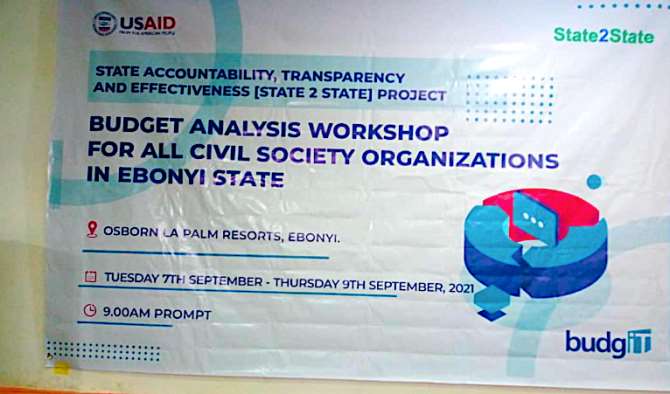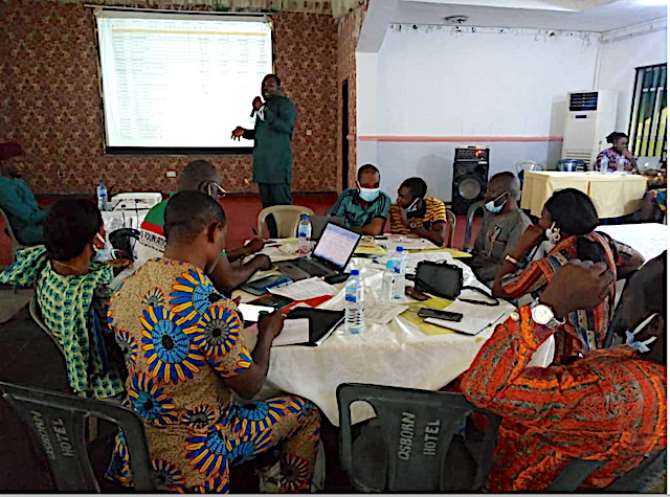Stakeholders Decry Delay in Federal Projects in Ebonyi as USAID-S2S,BudgIT Train CSOs on Budgeting

Civil Society and Non-governmental Organizations in Ebonyi State has decried the delay in commencement of most federal Constituency and consolidated projects in the State provided for in the 2021 budget.
The Organizations also lamented the non-inclusive nature of projects provided for in the Ebonyi 2021 budget which they observed, lacked consideration for people living with disabilities.
The concerns were part of outcome of a 3-day Budget awareness, consultation and analysis workshop for Civil Society Organizations in Ebonyi State.
The workshop held at the Osborne La Palm Hotels, Abakaliki, was organized by the United States Agency for International Development - funded State Accountability, Transparency and Efectiveness (State2State) project, in collaboration with BudgIT/Tracka Foundation.
Participant drawn from CSOs across the State as well as resource persons at the workshop were unanimous in agreement that Nigeria's budgeting process both at the federal and State levels still lacked the prescribed measure of gender equality and social inclusion.
They stressed that the non-involvement of citizens in the budgeting process: planning/preparation, review/approval, implementation and monitoring/evaluation, often resulted to poor needs assessment which hampers the evolution of a citizens budget.
Reacting to issues raised during the workshop, the Executive Director of Development Integrity Intervention Goals Foundation, Oliver Chima Ajah and his counterpart, the Project Director of GraceField Development Initiative, Azonauche Agwu, among others, commended State2State for their efforts towards ensuring transparency in the management of Budget in the State.
They observed that 2021 was the first time, Ebonyi State government incorporated public consultation in its budgeting process, but regretted that the consultation tactfully excluded genuine CSOs and other nonpartisan actors.
Agwu added: "At the end of the exercise, the inputs of the Citizens were not reckoned with, as they were not registered in the final budget."
"Moreover, only those purportedly loyal to the government were mainly invited for the consultation."
In an interview, one of the resource persons, and the Project tracking Officer for BudgIT/Tracka in Ebonyi State, Stella Omodia, challenged the CSOs to always equip themselves with facts and figures and other necessary information before engaging the government on issues relating to the citizens they represent.
She narrated that her field experience in the State revealed that most federal projects allocated to Ebonyi were yet to commence.
Omodia explained: "The present status in Ebonyi State is that none of the projects that I have visited so far has started.
"Though people attest that some delegates have visited, some taken measurements, and some to check sites for the projects.
"And During my sensitization visits to some communities, I do give out my number and tell them to inform me whenever those people come to start the projects, so that we can all supervise the project.
" Even when such projects begin, community people are supposed to be aware, so that we can both monitor the project from the onset to the finishing level.
"After the finishing level, it is now the responsibility of the community to provide security for the projects because it is established for their wellbeing."
Omodia further advised the CSOs to strive to win the confidence of the communities in order to receive the needed cooperation for their intervention works.
She also advised Ebonyi State government to establish a viable monitoring and evaluation team for projects in the State.
She said: "The communities Need the assurance that CSOs are not politicians, but independent group working for their welfare.
“For a sincere CSO, you don't need to belong to a political party, but that does not stop you from exercising your civic responsibility as a citizen.
"I found out that the Government do not have a viable monitoring team to actually monitor projects in Ebonyi State.
" I will.also implore the government to create a better understanding between itself, the CSOs and the communities to know that all are partners in project implementation and monitoring because it is the communities that would actually confirm whether or not, the projects provided for them in the budget are executed.
"If the government do the right thing, it will be a plus to them because it means they are striving to cover the needs of the citizens, who in turn will give government solidarity.
"On the area of empowerment, political leaders should not use it as a means of settling their own supporters alone because immediately after elections, they are no longer the leaders and representatives of their supporters alone but the entire Ebonyi State.
In so doing, they should also ensure equitability in distribution of benefits to all zones as well as ensure gender and social inclusion."
Earlier, the State Team Lead, USAID-State2State, Sam Onyi had explained that the objective of the workshop was to build capacity of CSOs in the State to effectively analyse State budgets for better engagement with government, and for the ultimate welfare of the citizens.
He explained that State2State accountability, transparency and effectiveness program is located in six pilot State in Nigeria: Ebonyi, Adamawa, Akwa-Ibom, Bauchi, Gombe and Sokoto.
He further implored the CSOs to keep faith with USAID-State2State as they collaborate to ensure that accountability and transparency is gradually instituted in the State's fiscal policies.
Other resource persons featured in the workshop included the Citizen Engagement Director & Advisory Team Lead for USAID- S2S, Ahmed Mohammed; the Citizen Engagement and Capacity Building Specialist for S2S, Ebonyi State, Ibiam Azu Agwu; the Head, Open Government & Institutional Partnership for BudgIT Foundation, Tolutope Agunloye, and a Gender equity and social inclusion specialist, Ejiro Okotie.
Participants were extensively educated on Budget development process, terminologies, analysis tools, consultations; budget monitoring, advocacy strategies as well as gender responsive budgeting and inclusiveness.
The workshop also incorporated practical sessions on budget analysis and shared field experiences.
Speaking on the gains of the workshop, one of the participants and Executive Director of Succour and Development Services Initiative (SUCDEV), Catholic Diocese of Abakaliki, Reverend Sister Cecilia Chukwu, described the training workshop as apt, noting that it has enriched her knowledge on issues on budget and budgeting.
She pledged to effectively utilize the knowledge both in her intervention works and in the administration of her CSO.
Chukwu added: This training has opened my eyes.
"Before now, I did not know much about government budgeting, though I have assessed government projects on Water, Sanitation and Hygiene.
"This knowledge on Budget analysis and monitoring will help me do my job more efficiently and ensure value for money even in my own organization.
"I will also deepen inclusiveness in my practice and projects.


